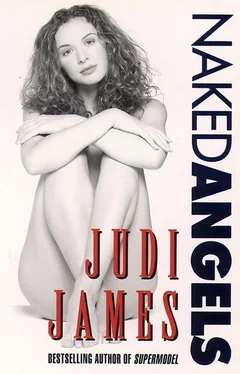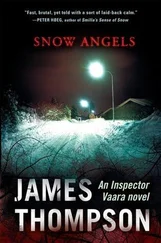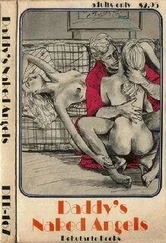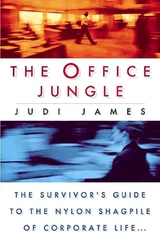When they got to the house Grandma Klippel was not on the porch as usual but waiting in the best lounge beside a tray of tea. Evangeline had not been in the room much before. Someone had taken the sheets off the chairs and there was a fire burning and spitting in the hearth; they had put pine logs on the fire and the smoke smelt sweet. Mrs O’Reilly must have been up earlier than usual because there was the biggest bunch of anemones ever in a porcelain bowl on the centre table.
The room itself was mainly reds and rose pinks, and would have looked jolly enough had it not been for the expression on Grandma Kippel’s face. Her nose was as crimson as the wallpaper and she looked like she had a cold. Her eyes were swollen and her hands looked fidgety. When she picked up her cup it danced noisily in its saucer.
There was a man in the room. Evangeline thought he must be the new chauffeur, even though she had no idea the old one was leaving. The man was no taller than her grandmother but he had thick hands that were making heavy work of the bone china. His dark hair was cut short and greased back and he wore a suit that looked wrong for his body. He smelt faintly of frying, as though he had stopped off at the diner on the journey down from wherever he lived.
‘Evangeline,’ her grandmother said, ‘… dear, this is Mr Castelli.’
He had a good-looking face, even though he was nervous. Evangeline stepped forward to take his hand, wondering why it was so important for her to meet the new chauffeur.
‘Mr Castelli is your father, Evangeline, your real father.’
She stopped before their hands touched. The man gave her grandmother what looked like an angry glance before turning back to stare at her. It made her itchy-uncomfortable.
‘Darius is my father.’ She knew she’d used the wrong tense but anything else would have hurt her too much to say it.
Grandma Klippel’s face looked funny, as though she wanted to sneeze and was trying not to.
‘Darius was only your father because he married your mother, Evangeline. When he adopted you he took you for his own, I know that. But Mr Castelli is your father by blood. Do you understand? He was married to your mother before she met my son.
‘I know she told you about him. Darius was always insistent about discussing things frankly. Do you remember?’
Evangeline nodded. She had always known she had two fathers but she’d thought this one didn’t matter because she had never even seen him. He had a wide neck, like a boxer. His tie was done up, but the top button of his collar was left undone. Evangeline wished he hadn’t done that because she knew her grandmother would not approve. She liked men to look properly smart, it was something she often remarked on. A person’s dress was a strong guide to their character, as far as Grandma Klippel was concerned. Mr Castelli would have been tested and found wanting. He had sallow-looking skin and a strong, beefy nose.
‘You look just like your mother, Evangeline,’ he said.
‘No,’ Evangeline told him wisely, ‘I look just like you.’
Mikhail waited until Claude was at work before ransacking the apartment. Things had got out of hand. Tincan had been right: you had to get on. Nothing else mattered – it was stupid to pretend that it did. He threw things from cupboards and broke plates and glasses against the walls. He found Claude’s savings beneath the mattress on his father’s bed. The old man had said nothing as he took it, just stared at him with an evil glint in his eye. Maybe he had known Mikhail was living there. Maybe other boys had done the same thing.
Claude’s payments had never materialized after the first week. Mikhail had reminded him many times but Claude always came up with an excuse. For a man who worked in a bank he seemed strangely forgetful when it came to cash.
Mikhail counted out the exact amount he was owed and then sat staring at the rest. Put yourself first. Nothing else matters. He took a few notes more, then he put them back. Then he stuffed the whole wad into his pocket. Then he pulled it out again. Was he a thief or not? He couldn’t decide.
The long winter was over. As the snow cleared Mikhail had started cleaning the windows of Claude’s apartment of all their dust and grime, so that he could look out onto the small square below. He went out so little that his skin was unnaturally pale. He was a little fatter now, and Claude had bought him new clothes.
When Claude went out he would read or sleep and when he came back they would talk or he would pose for more photos. He also liked to take baths – lots of them – because he always felt dirty.
There was a smear on the glass. He licked his sleeve and wiped the smear off with spit. The more the sun shone the more oppressive the apartment had become. Claude would never turn the heating down because he said it was bad for his father’s health. When he came home he would take off his suit and wear a cotton kimono instead.
Watching other children in the square below was the most painful thing of all. There were boys of his age down there, playing football and messing about. He used to look at himself in the mirror sometimes, asking himself why he had deserved such a fate.
Claude liked to pose as much as he liked taking photos. Mikhail had discovered this fact while rooting out some photos of him in a suitcase under the bed.
‘Show me what to do and I’ll photograph you,’ he told Claude the next time they did some shots together. Claude had been selling the shots of him now, he was sure of it – not paying Mikhail for the posing, while he was getting paid well himself. He had tried not to think of all the men who must have looked at them.
Claude had looked pleased with Mikhail’s suggestion. He had shown Mikhail all the basics: how to set the lights, how to focus, and how to frame a shot. Then he’d sat coyly in front of the camera, beaming, while Mikhail clicked away.
Printing the photographs had been less fun, but Mikhail had persisted. Claude used the bathroom as a darkroom and, with two of them in there, it became over-crowded. He placed planks over the bath to use as a table and there was a red bulb in the socket that gave an eerie glow in the darkness. Claude apologized every time they got squeezed together and Mikhail didn’t know what was worse, the touching or the bleating apologies. There was a certain magic in the printing process that enthralled him every time, though. You put paper into a tank of fluid and faces appeared on that paper. He saw Claude’s face, weak and beaming, appearing slowly as he slooshed the stuff around.
He could almost stand Claude’s simpering smiles since he had come to the decision about leaving. He was not going back onto the streets, though. That much he knew for sure. He looked at the money again. Half of it, that was fair for all he’d been through. Half of it would be enough to teach Claude a lesson. He counted the notes into two piles and then worked out how long he could live on the money. He would need a job when it ran out; or he would need a job straight away if he was to spend the cash on a plane ticket. He stood up and padded into the studio. Claude’s camera was still on its tripod.
Mikhail unscrewed the camera carefully and wrapped it in a sheet before stuffing it inside his jacket and pulling up the zip. As he did so he heard Claude’s key in the lock.
‘Guess what,’ he heard Claude holler, ‘a robbery at the bank!’ He sounded happy. ‘Thieves broke in last night, and once we had been interviewed by the police they said we should have the rest of the day off while they cleared up—’ He saw the carnage inside his precious apartment and froze in the doorway.
‘Holy shit…’ Mikhail had never heard him swear before. It sounded funny and made him want to laugh. ‘Mikhail?’ Claude’s voice dropped. Mikhail heard him creeping around, looking for burglars. Two robberies in one day! He would spend the rest of his life telling the story.
Читать дальше












